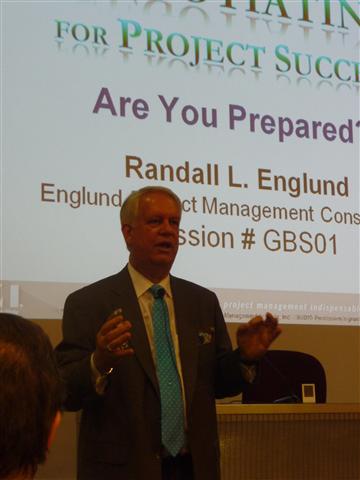 Upper management support is crucial for project success. Their support in sponsoring projects, however, often falls short of what is necessary to ensure project success. Why? Is it ignorance, lack of knowledge about what’s required, distaste for the role, too busy, unwilling, …? Well, maybe so, but a key ingredient is the ability of project managers to manage upwards and effectively negotiate with their sponsors. It is important to appreciate how negotiating skills dramatically enhance the ability to obtain effective sponsorship and to sustain sponsorship support all the way through to project success.
Upper management support is crucial for project success. Their support in sponsoring projects, however, often falls short of what is necessary to ensure project success. Why? Is it ignorance, lack of knowledge about what’s required, distaste for the role, too busy, unwilling, …? Well, maybe so, but a key ingredient is the ability of project managers to manage upwards and effectively negotiate with their sponsors. It is important to appreciate how negotiating skills dramatically enhance the ability to obtain effective sponsorship and to sustain sponsorship support all the way through to project success.
Begin with a mindset that everything about a project is negotiable and that a project leader needs to be a skilled negotiator. Define project success and establish desired outcomes. Review basic negotiation principles. Understand and use negotiating techniques as a means to move people from stalemate to solution.
A goal for every manager is to advance the state of excellence around project sponsorship, starting with the imperative for project managers to take the initiative, first to learn the “rules” of negotiating and then to apply them through continuous dialogue with sponsors (and all other stakeholders), ultimately leading to improved results from projects. This happens because effective negotiations bring clarity about what and how projects will be implemented.
At the beginning of any endeavor is the ideal time to negotiate. Before accepting a project assignment, ask many questions, such as:
- Why are we doing this project?
- What problem is this project solving?
- How was this project selected—process, criteria?
- What strategic goal does this project support?
- Are we fully prepared to resource this project?
- What constitutes project success?
When being asked to do the impossible, with no resources, and by tomorrow, the project is in trouble. Most projects are not quite this bad…but come very close. It is not acceptable to be set up for failure. However, it may take a changed mindset—and courage—to engage in negotiations with upper management. The beginning of a project is the time to negotiate all facets relating to that project. Also make it clear that the intent is creating an environment for successful projects.
Creating a project office is an example of a concerted effort to manage projects, programs, and portfolios across the organization. This effort may be a massive change for the organization, requiring intense negotiations to adopt, adapt, and apply a change management process.
An imperative for every project manager is to manage upwards and engage in negotiations. Because of the intimate knowledge that project managers usually possess about projects and their requisite ability to systematically get things done in a timely manner, they possess the four basic forces that drive successful negotiations: power, information, timing, and approach. These forces place the project manager is in a better position to negotiate with the sponsor.
When applying these techniques in n a typical interchange, a sponsor makes an unreasonable demand, the project manager pushes back to say it cannot be done, negotiations ensue and a set of modified objectives are identified, the project manager confirms that the project is doable, the sponsor approves the project, and the project manager accepts the project. Sponsors need to accept that this interchange is necessary. Some old school “command and control” sponsors may not like this approach, believing when they issue orders, others should follow. They may perceive project managers as being insubordinate. New school “lead and coach” sponsors accept the interchange as natural. Effective project managers develop and apply skills to push back and engage in collaborative negotiations with sponsors. Both sides apply due diligence in fulfilling mutually satisfying roles.
A checklist for negotiating with a sponsor includes:
- Determine when to negotiate
- Do necessary preparations
- Apply rules of negotiating
- Summon courage and fortitude to negotiate through difficult situations
- Create effective alternatives for reaching successful agreements
- Move sponsors from ineffective positions to more cooperative and mutually beneficial approaches to issue resolution
- Negotiate project deadlines
- Reach agreement on definition of project success
- Develop acceptable concessions
- Skillfully use power, information, approach and timing in a negotiation
- Bring each negotiation to a successful close.
|
Join Randy Englund at the PMI North America Congress in Washington DC October 10-14 where he presents a paper on “Negotiating with My Sponsor” and a seminar on “Tips and Techniques for Gaining Management Support.” |
Randy Englund, www.englundpmc.com, www.projectsponsorship.com
